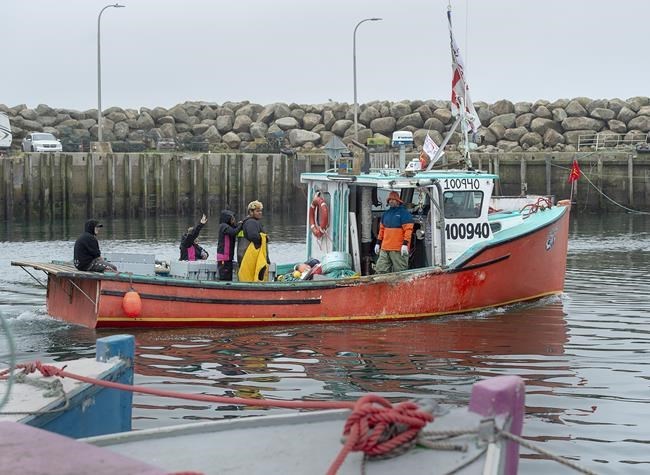HALIFAX — A Mi'kmaq community is further delaying plans for a lobster harvest that was set to start this week off southwestern Nova Scotia, saying the band will have to set up its own security to protect its traps.
Chief Mike Sack of Sipekne'katik First Nation said today the band is also concerned about the safety of its fishers after violence erupted last fall when fishers from the community set traps in St. Marys Bay.
Last week, Sack had said the band would scale back a plan for a "moderate livelihood" fishery of 50 traps per boat originally set to begin on June 1, instead proposing a food fishery with just five traps per person.
The Mi'kmaq First Nation has argued it has the right to fish for a moderate livelihood when and where members wish, based on a landmark 1999 Supreme Court decision. The court later clarified that ruling to say Ottawa could regulate the treaty right for conservation and other limited purposes.
Federal Fisheries minister Bernadette Jordan has said she's attempted unsuccessfully to negotiate a moderate livelihood fishery with Sipekne'katik where the bands' fishers would have access to lobster grounds within a federally regulated season in a neighbouring lobster area.
However, Sack said in an interview Wednesday the offer of licences on fishing grounds south of St. Marys Bay didn't provide enough access, and the smaller boats the band operates aren't suited to the more open waters.
Sack said the band only has a few boats ready to return to the Saulnierville wharf, where they were based last summer, and it wouldn't be safe for such a small number to operate in St. Marys Bay amid hostility from non-Indigenous fishers.
"Our people are working on trying to rebuild from last season, and we don't want to send just a couple down there without a support system, just in case something did happen," he said.
"We plan on going (fishing) in a short time, once we have enough people ready to go." He estimated that last year there were about 20 boats from the band fishing in the area.
The chief said that his community lost about 4,000 traps due to lines being cut or traps removed last year, and to date the federal Fisheries Department has returned about 380.
“We’ve had a number of meetings and discussions over the past week with our fishers, and simply put, they don’t feel safe taking to the water this week or even in the coming weeks,” Sack said in a news release. “The reality is that we would need to provide our own security and police our own gear getting seized, and it feels like a costly prospect for our community after all that we have lost.”
This report by The Canadian Press was first published June 2, 2021.
Michael Tutton, The Canadian Press



